Related Research Articles

A mnemonicdevice, or memory device, is any learning technique that aids information retention or retrieval (remembering) in the human memory for better understanding.
The major system is a mnemonic technique used to aid in memorizing numbers.
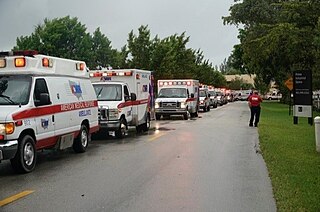
Emergency medical services (EMS), also known as ambulance services or paramedic services, are emergency services that provide urgent pre-hospital treatment and stabilisation for serious illness and injuries and transport to definitive care. They may also be known as a first aid squad, FAST squad, emergency squad, ambulance squad, ambulance corps, life squad or by other initialisms such as EMAS or EMARS.
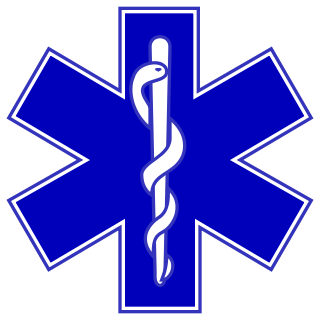
An emergency medical technician (EMT), also known as an ambulance technician, is a health professional that provides emergency medical services. EMTs are most commonly found working in ambulances. In English-speaking countries, paramedics are a separate profession that has additional educational requirements, qualifications, and scope of practice.

A paramedic is a health care professional whose primary role is to provide advanced emergency medical care for critical and emergent patients who access the emergency medical system.

Johnny Mnemonic is a 1995 cyberpunk action thriller film directed by Robert Longo in his directorial debut. The film stars Keanu Reeves and Dolph Lundgren. The film is based on the story of the same name by William Gibson. Keanu Reeves plays the title character, a man with a cybernetic brain implant designed to store information. The film portrays Gibson's dystopian view of the future with the world dominated by megacorporations and with strong East Asian influences.

Emergency! is an American television series that combines the medical drama and action-adventure genres. It was a joint production of Mark VII Limited and Universal Television. It debuted on NBC as a midseason replacement on January 15, 1972, replacing the two short-lived situation comedy series The Partners and The Good Life, and ran for a total of 122 episodes until May 28, 1977, with six additional two-hour television films during the next two years, 1978 and 1979.
Piphilology comprises the creation and use of mnemonic techniques to remember many digits of the mathematical constant π. The word is a play on the word "pi" itself and of the linguistic field of philology.

"Johnny Mnemonic" is a science fiction short story by American-Canadian writer William Gibson, which served as inspiration for the 1995 film of the same name. The short story first appeared in Omni magazine in May 1981, and was subsequently included in 1986's Burning Chrome, a collection of Gibson's short fiction. It takes place in the world of Gibson's cyberpunk novels, predating them by some years, and introduces the character Molly Millions, who plays a prominent role in Gibson's Sprawl trilogy of novels.

ROYGBIV or Roy G. Biv is an acronym for the sequence of hues commonly described as making up a rainbow: red, orange, yellow, green, blue, indigo and violet. The initialism is sometimes referred to in reverse order, as VIBGYOR.
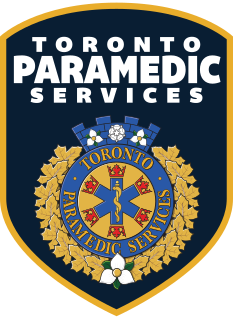
The City of Toronto Paramedic Services, is the statutory emergency medical services provider in Toronto, Ontario, Canada. The service is operated as a division of the City of Toronto, under the Community & Social Services cluster. The service is funded by the municipal tax base, and operates similarly to other municipal divisions, such as the Toronto Parks, Forestry & Recreation division, or the Toronto Water division, but retains operational independence from other divisions. While under municipal government control, it is subject to provincial legislation and licensing. It is not the only service provider in its area; private-for-profit medical transport services also provide routine, non-emergency transports and coverage for special events, but the statutory emergency medical system is the only provider permitted to service emergency calls.
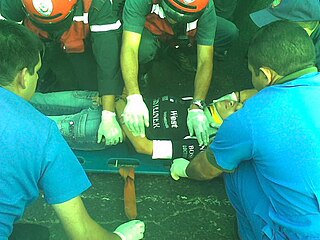
Advanced trauma life support (ATLS) is a training program for medical providers in the management of acute trauma cases, developed by the American College of Surgeons. Similar programs exist for immediate care providers such as paramedics. The program has been adopted worldwide in over 60 countries, sometimes under the name of Early Management of Severe Trauma, especially outside North America. Its goal is to teach a simplified and standardized approach to trauma patients. Originally designed for emergency situations where only one doctor and one nurse are present, ATLS is now widely accepted as the standard of care for initial assessment and treatment in trauma centers. The premise of the ATLS program is to treat the greatest threat to life first. It also advocates that the lack of a definitive diagnosis and a detailed history should not slow the application of indicated treatment for life-threatening injury, with the most time-critical interventions performed early.

Emergency medical services in the United Kingdom provide emergency care to people with acute illness or injury and are predominantly provided free at the point of use by the four National Health Services (NHS) of England, Scotland, Wales, and Northern Ireland. Emergency care including ambulance and emergency department treatment is only free to UK residents and a charge may be made to those not entitled to free NHS care. The NHS commissions most emergency medical services through the 14 NHS organisations with ambulance responsibility across the UK.
ASHICE is one of several mnemonic acronyms used by emergency medical services in the United Kingdom and the Republic of Ireland to pass summarised advance details of a patient to the next group of persons or organisation dealing with them. In the English and Welsh NHSs the procedure is not used for non-critical patients on their eventual journey to hospital but is used as standarocedure for handovers of patients before transport to hospital where a site or event is staffed by trained personnel of both paid or voluntary ambulance services. This procedure is in addition to written records of the patient's personal and medical details and any treatment or medication applied prior to transport to the hospital.
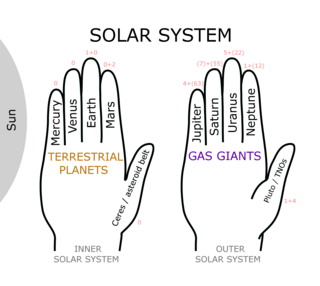
A planetary mnemonic refers to a phrase used to remember the planets and dwarf planets of the Solar System, with the order of words corresponding to increasing sidereal periods of the bodies. One simple visual mnemonic is to hold out both hands side-by-side with fingers spread and thumbs in the same direction, with the fingers of one hand representing the terrestrial planets, and the other hand the gas giants. The first thumb represents the Sun and asteroid belt, including Ceres, and the second thumb represents the asteroid belt and trans-Neptunian objects, including Pluto.
Memory sport, sometimes referred to as competitive memory or the mind sport of memory, refers to competitions in which participants attempt to memorize then recall different forms of information, under certain guidelines. The sport has been formally developed since 1991 and features national and international championships. The primary worldwide organizational bodies are the IAM and WMSC.
CASMEET is a mnemonic acronym used by emergency medical services to communicate the important details of a patient over to an emergency control centre, receiving hospital, or other definitive care provider. A CASMEET message can be sent in order to pre-alert a receiving emergency department that a critically ill patient is being brought in. It can be used as an alternative to ASHICE.
AEIOU-TIPS is a mnemonic acronym used by some medical professionals to recall the possible causes for altered mental status. Medical literature discusses its utility in determining differential diagnoses in various special populations presenting with altered mental status including infants, children, adolescents, and the elderly. The mnemonic also frequently appears in textbooks and reference books regarding emergency medicine in a variety of settings, from the emergency department and standard emergency medical services to wilderness medicine.
Picmonic, Inc. is an audiovisual learning platform with headquarters in Tempe, Arizona. It was established in 2011 by two medical students to help students retain and recall the large amount of facts studied in medical school. Picmonic name is a portmanteau of Picture and mnemonic. As for 2020, the website contains more than 2000 audiovisual picmonic video-quiz lessons and the company claims that 750,000 learners have used the website.